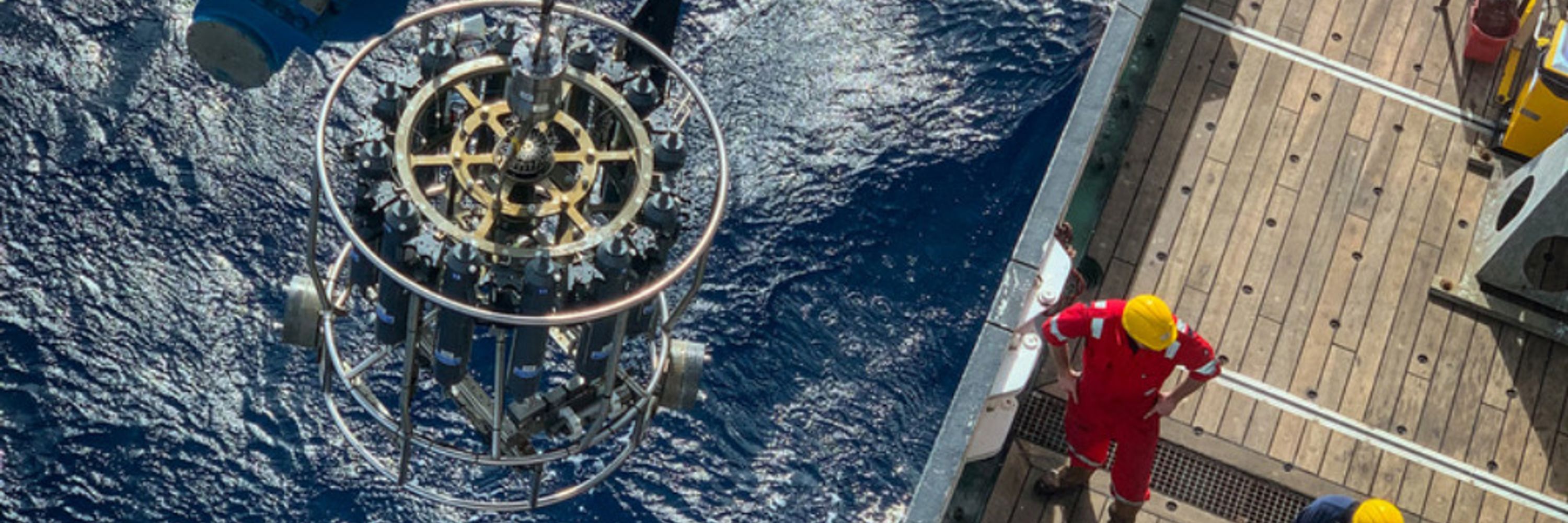
Jens Daniel Müller
@jens-d-mueller.bsky.social
Climate Scientist focused on the Ocean Carbon Cycle and Climate Solutions // Now Research Fellow at Carbon to Sea // Former Postdoc at ETH Zurich.
https://jens-daniel-mueller.github.io
https://jens-daniel-mueller.github.io
🚀 Exciting next step: I’ll soon start as a Research Fellow at Carbon to Sea! 🌊

September 15, 2025 at 1:50 PM
🚀 Exciting next step: I’ll soon start as a Research Fellow at Carbon to Sea! 🌊
Overall, the sink’s response was much more muted than one might expect from the temperature rise alone. Feedbacks depleted DIC in the surface ocean, stabilizing the carbon sink in 2023.

September 2, 2025 at 11:59 AM
Overall, the sink’s response was much more muted than one might expect from the temperature rise alone. Feedbacks depleted DIC in the surface ocean, stabilizing the carbon sink in 2023.
The decline must have come from the extra-tropics, where unusual warming triggered anomalous CO₂ outgassing. This effect was especially extreme in the subtropical North Atlantic.

September 2, 2025 at 11:59 AM
The decline must have come from the extra-tropics, where unusual warming triggered anomalous CO₂ outgassing. This effect was especially extreme in the subtropical North Atlantic.
Usually, warm years strengthen the ocean carbon sink, as El Niño reduces CO₂ outgassing in the tropical Pacific. This response occurred in 2023 as well – but it wasn’t enough to offset what happened elsewhere.


September 2, 2025 at 11:59 AM
Usually, warm years strengthen the ocean carbon sink, as El Niño reduces CO₂ outgassing in the tropical Pacific. This response occurred in 2023 as well – but it wasn’t enough to offset what happened elsewhere.
We found that CO₂ uptake over the global non-polar ocean unexpectedly declined by 0.27 ± 0.13 PgC. That’s a decline of ~10% and equal to half the EU’s annual CO₂ emissions!

September 2, 2025 at 11:59 AM
We found that CO₂ uptake over the global non-polar ocean unexpectedly declined by 0.27 ± 0.13 PgC. That’s a decline of ~10% and equal to half the EU’s annual CO₂ emissions!
Good morning #EGU25!
Do you want to know what the record high sea surface temperatures did to the ocean carbon sink?
Come and see me after the coffee break (11:35) in Room C:
meetingorganizer.copernicus.org/EGU25/EGU25-...
Do you want to know what the record high sea surface temperatures did to the ocean carbon sink?
Come and see me after the coffee break (11:35) in Room C:
meetingorganizer.copernicus.org/EGU25/EGU25-...
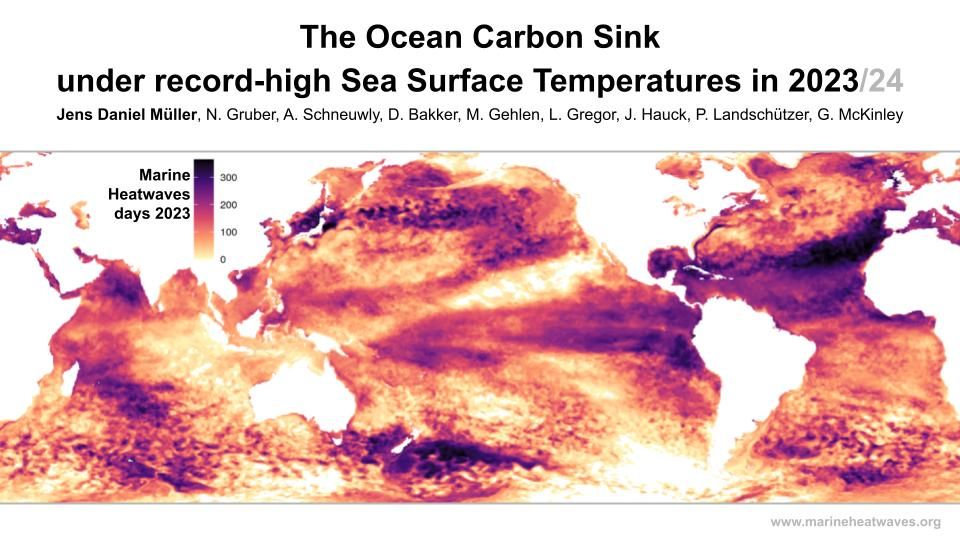
April 28, 2025 at 7:36 AM
Good morning #EGU25!
Do you want to know what the record high sea surface temperatures did to the ocean carbon sink?
Come and see me after the coffee break (11:35) in Room C:
meetingorganizer.copernicus.org/EGU25/EGU25-...
Do you want to know what the record high sea surface temperatures did to the ocean carbon sink?
Come and see me after the coffee break (11:35) in Room C:
meetingorganizer.copernicus.org/EGU25/EGU25-...
Interesting that - on a global average - the ocean carbon sink weakens under MHWs. In contrast, the annual mean CO₂ uptake tends to be anomalously strong when the global mean SST is high (see top left panel). How should we explain this apparent contradiction?
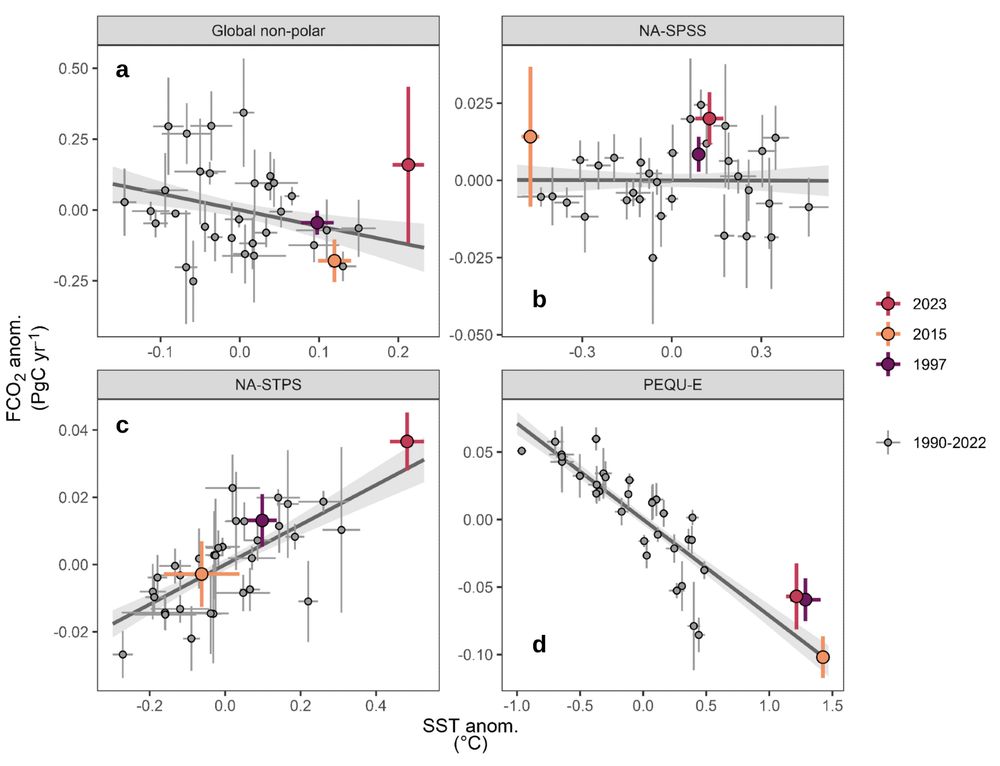
December 16, 2024 at 9:33 AM
Interesting that - on a global average - the ocean carbon sink weakens under MHWs. In contrast, the annual mean CO₂ uptake tends to be anomalously strong when the global mean SST is high (see top left panel). How should we explain this apparent contradiction?
The ocean was unusually hot in 2023 👇
We found that this caused an unexpected decline of the ocean carbon sink, primarily driven by anomalous outgassing of CO₂ in the northern hemisphere extratropics.
▶️ doi.org/10.21203/rs....
Feedback on our preprint is more than welcome!
🌊
We found that this caused an unexpected decline of the ocean carbon sink, primarily driven by anomalous outgassing of CO₂ in the northern hemisphere extratropics.
▶️ doi.org/10.21203/rs....
Feedback on our preprint is more than welcome!
🌊

December 12, 2024 at 12:56 PM
The ocean was unusually hot in 2023 👇
We found that this caused an unexpected decline of the ocean carbon sink, primarily driven by anomalous outgassing of CO₂ in the northern hemisphere extratropics.
▶️ doi.org/10.21203/rs....
Feedback on our preprint is more than welcome!
🌊
We found that this caused an unexpected decline of the ocean carbon sink, primarily driven by anomalous outgassing of CO₂ in the northern hemisphere extratropics.
▶️ doi.org/10.21203/rs....
Feedback on our preprint is more than welcome!
🌊
Was great to have you around for a week, @davidho.bsky.social. Hope you enjoyed it!

December 7, 2024 at 11:33 AM
Was great to have you around for a week, @davidho.bsky.social. Hope you enjoyed it!
[6/6] Translating acidification trends into biological impacts is tricky, as the background state and organism sensitivity come into play. We dared to showcase this complexity for the region-specific shell dissolution of pteropods, key players in maintaining the ocean’s carbonate pump.
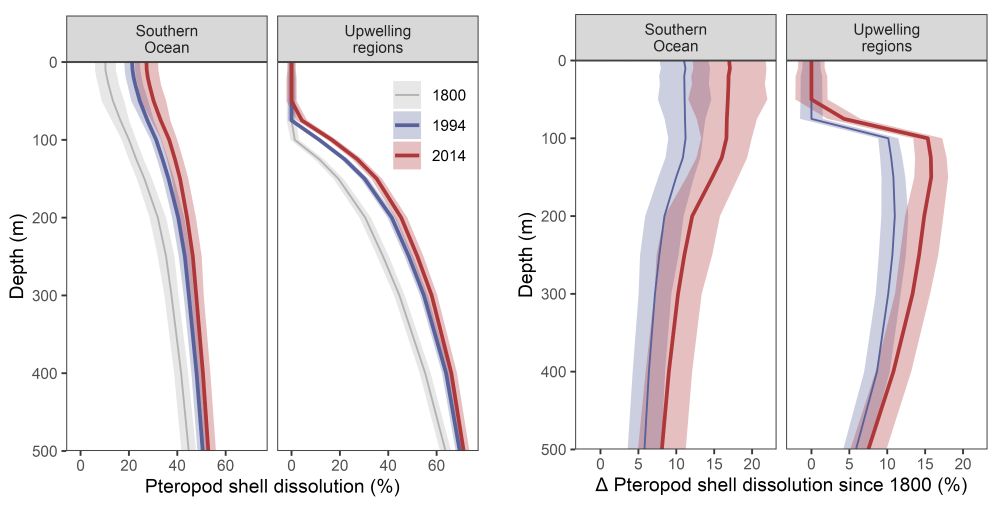
November 28, 2024 at 9:22 AM
[6/6] Translating acidification trends into biological impacts is tricky, as the background state and organism sensitivity come into play. We dared to showcase this complexity for the region-specific shell dissolution of pteropods, key players in maintaining the ocean’s carbonate pump.
[5/6] The loss of supersatured waters results from the shoaling of the saturation horizon. For aragonite, this horizon has shoaled by more than 200m on a global average and particularly fast in the Southern Ocean. The consequences for biogeochemical cycles and marine biota are largely unknown.
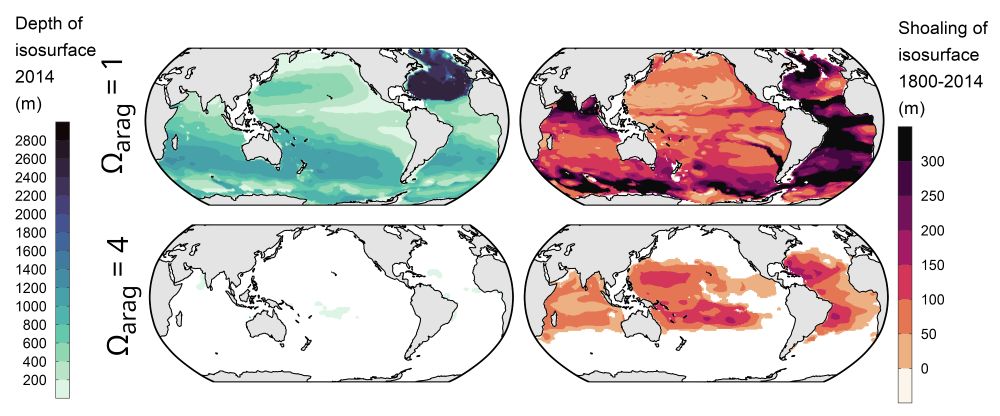
November 28, 2024 at 9:22 AM
[5/6] The loss of supersatured waters results from the shoaling of the saturation horizon. For aragonite, this horizon has shoaled by more than 200m on a global average and particularly fast in the Southern Ocean. The consequences for biogeochemical cycles and marine biota are largely unknown.
[4/6] The decline of the saturation state of aragonite caused an almost complete disappearance of waters providing optimal conditions (Ω>4) for the growth of warm water corals. Likewise, the volume of supersatured waters (Ω>1) has declined by ~20% since preindustrial time.
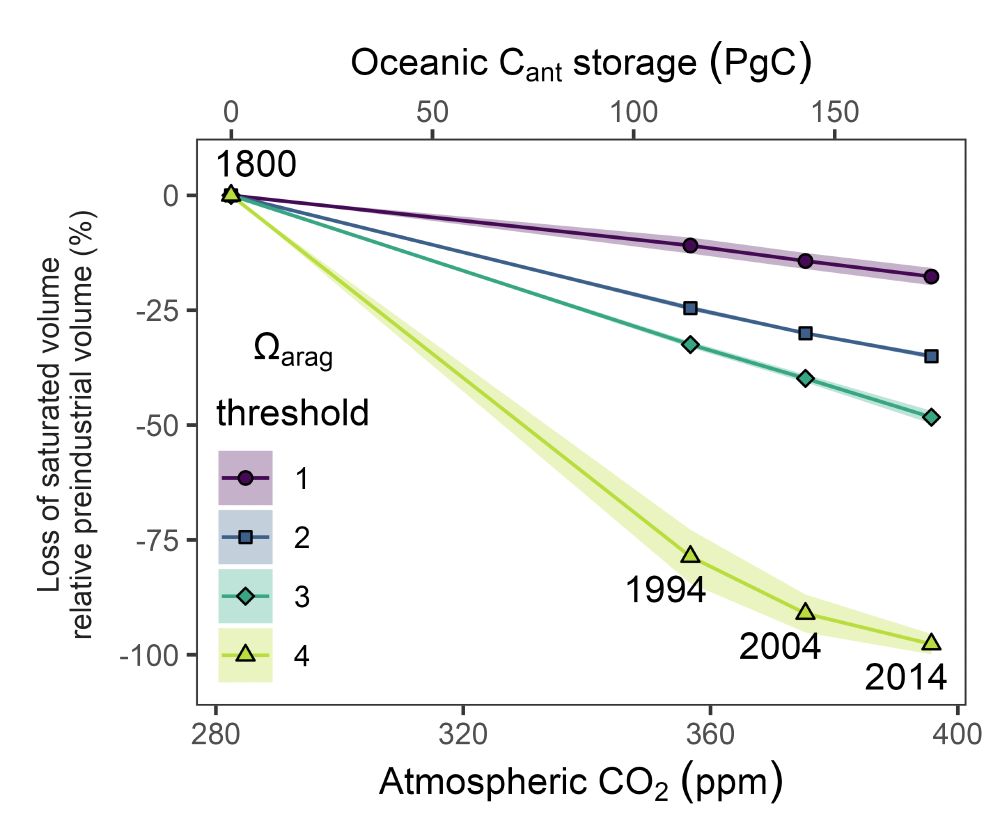
November 28, 2024 at 9:22 AM
[4/6] The decline of the saturation state of aragonite caused an almost complete disappearance of waters providing optimal conditions (Ω>4) for the growth of warm water corals. Likewise, the volume of supersatured waters (Ω>1) has declined by ~20% since preindustrial time.
[3/6] Acidification rates of H⁺ and pH (but not CO₃²⁻ and Ω!) at depth can exceed surface rates. This happens when small amounts of anthropogenic carbon accumulate in naturally acidified waters with low buffer capacity, such as upwelling regions along eastern boundaries.
![Maps of the changes in the free proton concentration (Δ[H+]) from 1800 - 2014, averaged over two depth layers from 0 m to 100 m, and from 100 m to 500 m. Stippling indicates locations where the magnitude of the acidification signal is smaller than the corresponding uncertainty.](https://cdn.bsky.app/img/feed_thumbnail/plain/did:plc:vnatj6ys5y2fjs6suxxokbh4/bafkreihpsvcxus46dtu64dghtz4bxwvvkfq35qegsk36hxl7av5ke2crma@jpeg)
November 28, 2024 at 9:22 AM
[3/6] Acidification rates of H⁺ and pH (but not CO₃²⁻ and Ω!) at depth can exceed surface rates. This happens when small amounts of anthropogenic carbon accumulate in naturally acidified waters with low buffer capacity, such as upwelling regions along eastern boundaries.
[2/6] A striking feature of ocean interior acidification is its deep reach and the rapid acceleration over the past two decades. Across all depths, the acidification has progressed by 50% between 1994-2014.
![Global mean vertical profiles of the changes in the marine CO2 system. From left to right: Progression of changes in the saturation state of aragonite (ΔΩarag), the free proton concentration (Δ[H+]), and pH on the total scale (ΔpHT). Colors distinguish changes since 1800 for the reference years 1994, 2004, and 2014. Ribbons around lines indicate uncertainty ranges of our estimates.](https://cdn.bsky.app/img/feed_thumbnail/plain/did:plc:vnatj6ys5y2fjs6suxxokbh4/bafkreiehfn7iofkzvfopggaldjttsamz32tpxcqetkyx7l4lwxq4gcoecq@jpeg)
November 28, 2024 at 9:22 AM
[2/6] A striking feature of ocean interior acidification is its deep reach and the rapid acceleration over the past two decades. Across all depths, the acidification has progressed by 50% between 1994-2014.
[10/10]
Ishii et al. found that the Pacific turned into a net CO₂ sink, as the uptake of anthropogenic CO₂ became larger than the natural outgassing of CO₂. Still, interannual variations in natural CO₂ fluxes also superimpose on the global ocean carbon sink.
doi.org/10.22541/ess...
(preprint)
🌊
Ishii et al. found that the Pacific turned into a net CO₂ sink, as the uptake of anthropogenic CO₂ became larger than the natural outgassing of CO₂. Still, interannual variations in natural CO₂ fluxes also superimpose on the global ocean carbon sink.
doi.org/10.22541/ess...
(preprint)
🌊


November 11, 2024 at 3:23 PM
[10/10]
Ishii et al. found that the Pacific turned into a net CO₂ sink, as the uptake of anthropogenic CO₂ became larger than the natural outgassing of CO₂. Still, interannual variations in natural CO₂ fluxes also superimpose on the global ocean carbon sink.
doi.org/10.22541/ess...
(preprint)
🌊
Ishii et al. found that the Pacific turned into a net CO₂ sink, as the uptake of anthropogenic CO₂ became larger than the natural outgassing of CO₂. Still, interannual variations in natural CO₂ fluxes also superimpose on the global ocean carbon sink.
doi.org/10.22541/ess...
(preprint)
🌊
[9/10]
Resplandy et al. synthesised air-sea fluxes of three (!) greenhouse gases in the global coastal ocean. While the coastal ocean takes up substantial amounts of CO2, emissions of N20 and CH4 offset 30%–60% of this CO2 uptake in the net radiative balance.
doi.org/10.1029/2023...
🌊
Resplandy et al. synthesised air-sea fluxes of three (!) greenhouse gases in the global coastal ocean. While the coastal ocean takes up substantial amounts of CO2, emissions of N20 and CH4 offset 30%–60% of this CO2 uptake in the net radiative balance.
doi.org/10.1029/2023...
🌊


November 7, 2024 at 3:39 PM
[9/10]
Resplandy et al. synthesised air-sea fluxes of three (!) greenhouse gases in the global coastal ocean. While the coastal ocean takes up substantial amounts of CO2, emissions of N20 and CH4 offset 30%–60% of this CO2 uptake in the net radiative balance.
doi.org/10.1029/2023...
🌊
Resplandy et al. synthesised air-sea fluxes of three (!) greenhouse gases in the global coastal ocean. While the coastal ocean takes up substantial amounts of CO2, emissions of N20 and CH4 offset 30%–60% of this CO2 uptake in the net radiative balance.
doi.org/10.1029/2023...
🌊
[8/10]
Doney et al. revisited the biological carbon pump and found that the model–based export production fell at the lower end of observational estimates, suggesting that models underestimate the biological drawdown and air-sea fluxes of CO₂ in high productivity regions.
doi.org/10.1029/2024...
🌊
Doney et al. revisited the biological carbon pump and found that the model–based export production fell at the lower end of observational estimates, suggesting that models underestimate the biological drawdown and air-sea fluxes of CO₂ in high productivity regions.
doi.org/10.1029/2024...
🌊


November 6, 2024 at 2:10 PM
[8/10]
Doney et al. revisited the biological carbon pump and found that the model–based export production fell at the lower end of observational estimates, suggesting that models underestimate the biological drawdown and air-sea fluxes of CO₂ in high productivity regions.
doi.org/10.1029/2024...
🌊
Doney et al. revisited the biological carbon pump and found that the model–based export production fell at the lower end of observational estimates, suggesting that models underestimate the biological drawdown and air-sea fluxes of CO₂ in high productivity regions.
doi.org/10.1029/2024...
🌊
[7/10]
Sarma et al. examined CO₂ fluxes in the Indian Ocean. The general tendency of sources in the north and sinks in the south emerges clearly, but reconciling the model and observation-based maps of long-term mean fluxes remains challenging. More observations, please!
doi.org/10.1029/2023...
🌊
Sarma et al. examined CO₂ fluxes in the Indian Ocean. The general tendency of sources in the north and sinks in the south emerges clearly, but reconciling the model and observation-based maps of long-term mean fluxes remains challenging. More observations, please!
doi.org/10.1029/2023...
🌊


November 5, 2024 at 2:36 PM
[7/10]
Sarma et al. examined CO₂ fluxes in the Indian Ocean. The general tendency of sources in the north and sinks in the south emerges clearly, but reconciling the model and observation-based maps of long-term mean fluxes remains challenging. More observations, please!
doi.org/10.1029/2023...
🌊
Sarma et al. examined CO₂ fluxes in the Indian Ocean. The general tendency of sources in the north and sinks in the south emerges clearly, but reconciling the model and observation-based maps of long-term mean fluxes remains challenging. More observations, please!
doi.org/10.1029/2023...
🌊
[6/10]
Yasunaka et al. unravelled the exceptional role of climate change for the CO₂ sink in the Arctic Ocean. Here, the accelerated CO₂ uptake is primarily caused by sea ice loss, whereas rising atmospheric CO₂ dominates the trends in all other #RECCAP2 regions.
doi.org/10.1029/2023...
🌊
Yasunaka et al. unravelled the exceptional role of climate change for the CO₂ sink in the Arctic Ocean. Here, the accelerated CO₂ uptake is primarily caused by sea ice loss, whereas rising atmospheric CO₂ dominates the trends in all other #RECCAP2 regions.
doi.org/10.1029/2023...
🌊


November 4, 2024 at 12:25 PM
[6/10]
Yasunaka et al. unravelled the exceptional role of climate change for the CO₂ sink in the Arctic Ocean. Here, the accelerated CO₂ uptake is primarily caused by sea ice loss, whereas rising atmospheric CO₂ dominates the trends in all other #RECCAP2 regions.
doi.org/10.1029/2023...
🌊
Yasunaka et al. unravelled the exceptional role of climate change for the CO₂ sink in the Arctic Ocean. Here, the accelerated CO₂ uptake is primarily caused by sea ice loss, whereas rising atmospheric CO₂ dominates the trends in all other #RECCAP2 regions.
doi.org/10.1029/2023...
🌊
[5/10]
Terhaar, Goris et al. examined the models we used to disentangle CO₂ flux components. These GOBMs perform well! A lower CO₂ uptake than in observation-based estimates results from simulation setup, surface chemistry and ocean circulation.
doi.org/10.1029/2023...
@polarocean.bsky.social
🌊
Terhaar, Goris et al. examined the models we used to disentangle CO₂ flux components. These GOBMs perform well! A lower CO₂ uptake than in observation-based estimates results from simulation setup, surface chemistry and ocean circulation.
doi.org/10.1029/2023...
@polarocean.bsky.social
🌊


November 1, 2024 at 3:30 PM
[5/10]
Terhaar, Goris et al. examined the models we used to disentangle CO₂ flux components. These GOBMs perform well! A lower CO₂ uptake than in observation-based estimates results from simulation setup, surface chemistry and ocean circulation.
doi.org/10.1029/2023...
@polarocean.bsky.social
🌊
Terhaar, Goris et al. examined the models we used to disentangle CO₂ flux components. These GOBMs perform well! A lower CO₂ uptake than in observation-based estimates results from simulation setup, surface chemistry and ocean circulation.
doi.org/10.1029/2023...
@polarocean.bsky.social
🌊
[4/10]
Pérez et al. assessed the important CO₂ sink in the Atlantic Ocean. A major fraction of this CO₂ uptake is realised in the subpolar North Atlantic, where models and observation-based estimates still differ substantially with respect to trends and seasonality.
doi.org/10.1029/2023...
🌊
Pérez et al. assessed the important CO₂ sink in the Atlantic Ocean. A major fraction of this CO₂ uptake is realised in the subpolar North Atlantic, where models and observation-based estimates still differ substantially with respect to trends and seasonality.
doi.org/10.1029/2023...
🌊


October 31, 2024 at 2:50 PM
[4/10]
Pérez et al. assessed the important CO₂ sink in the Atlantic Ocean. A major fraction of this CO₂ uptake is realised in the subpolar North Atlantic, where models and observation-based estimates still differ substantially with respect to trends and seasonality.
doi.org/10.1029/2023...
🌊
Pérez et al. assessed the important CO₂ sink in the Atlantic Ocean. A major fraction of this CO₂ uptake is realised in the subpolar North Atlantic, where models and observation-based estimates still differ substantially with respect to trends and seasonality.
doi.org/10.1029/2023...
🌊
[3/10]
Rodgers et al. found that the seasonal amplitude of air-sea CO₂ fluxes increased over the past decades. We also show that the surface ocean DIC seasonality in biogeochemical ocean models is lower than in observation-based products. Something to improve…
doi.org/10.1029/2023...
🌊
Rodgers et al. found that the seasonal amplitude of air-sea CO₂ fluxes increased over the past decades. We also show that the surface ocean DIC seasonality in biogeochemical ocean models is lower than in observation-based products. Something to improve…
doi.org/10.1029/2023...
🌊


October 30, 2024 at 12:41 PM
[3/10]
Rodgers et al. found that the seasonal amplitude of air-sea CO₂ fluxes increased over the past decades. We also show that the surface ocean DIC seasonality in biogeochemical ocean models is lower than in observation-based products. Something to improve…
doi.org/10.1029/2023...
🌊
Rodgers et al. found that the seasonal amplitude of air-sea CO₂ fluxes increased over the past decades. We also show that the surface ocean DIC seasonality in biogeochemical ocean models is lower than in observation-based products. Something to improve…
doi.org/10.1029/2023...
🌊
[2/10]
Hauck et al. found that the Southern Ocean takes up 50% less CO₂ than reported in RECCAP1!
Still, most of the global CO₂ uptake occurs here, calling for a better understanding of trends, seasonality and interior transport of anthropogenic CO₂.
doi.org/10.1029/2023...
@jhauck.bsky.social
Hauck et al. found that the Southern Ocean takes up 50% less CO₂ than reported in RECCAP1!
Still, most of the global CO₂ uptake occurs here, calling for a better understanding of trends, seasonality and interior transport of anthropogenic CO₂.
doi.org/10.1029/2023...
@jhauck.bsky.social


October 29, 2024 at 3:22 PM
[2/10]
Hauck et al. found that the Southern Ocean takes up 50% less CO₂ than reported in RECCAP1!
Still, most of the global CO₂ uptake occurs here, calling for a better understanding of trends, seasonality and interior transport of anthropogenic CO₂.
doi.org/10.1029/2023...
@jhauck.bsky.social
Hauck et al. found that the Southern Ocean takes up 50% less CO₂ than reported in RECCAP1!
Still, most of the global CO₂ uptake occurs here, calling for a better understanding of trends, seasonality and interior transport of anthropogenic CO₂.
doi.org/10.1029/2023...
@jhauck.bsky.social
[1/10]
DeVries et al. assessed the Global Ocean Carbon Sink and found that models and fCO2 products agree on the long-term mean uptake of CO2, but recent trends differ by almost a factor of 2, indicating a need to better understand the impact of climate variability.
doi.org/10.1029/2023...
🌊
DeVries et al. assessed the Global Ocean Carbon Sink and found that models and fCO2 products agree on the long-term mean uptake of CO2, but recent trends differ by almost a factor of 2, indicating a need to better understand the impact of climate variability.
doi.org/10.1029/2023...
🌊


October 28, 2024 at 1:03 PM
[1/10]
DeVries et al. assessed the Global Ocean Carbon Sink and found that models and fCO2 products agree on the long-term mean uptake of CO2, but recent trends differ by almost a factor of 2, indicating a need to better understand the impact of climate variability.
doi.org/10.1029/2023...
🌊
DeVries et al. assessed the Global Ocean Carbon Sink and found that models and fCO2 products agree on the long-term mean uptake of CO2, but recent trends differ by almost a factor of 2, indicating a need to better understand the impact of climate variability.
doi.org/10.1029/2023...
🌊
#RECCAP2 wrap-up coming!
Over the past 5 years, 100 oceanographer's from all around the world scrutinised the ocean carbon sink through models and observations.
Our studies have been published in an special issue:
tinyurl.com/RECCAP2-spec...
Starting tomorrow, I'll introduce one paper a day.
🌊
Over the past 5 years, 100 oceanographer's from all around the world scrutinised the ocean carbon sink through models and observations.
Our studies have been published in an special issue:
tinyurl.com/RECCAP2-spec...
Starting tomorrow, I'll introduce one paper a day.
🌊

October 27, 2024 at 4:05 PM
#RECCAP2 wrap-up coming!
Over the past 5 years, 100 oceanographer's from all around the world scrutinised the ocean carbon sink through models and observations.
Our studies have been published in an special issue:
tinyurl.com/RECCAP2-spec...
Starting tomorrow, I'll introduce one paper a day.
🌊
Over the past 5 years, 100 oceanographer's from all around the world scrutinised the ocean carbon sink through models and observations.
Our studies have been published in an special issue:
tinyurl.com/RECCAP2-spec...
Starting tomorrow, I'll introduce one paper a day.
🌊

